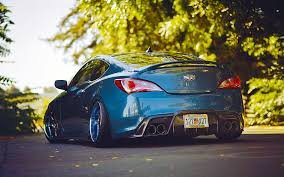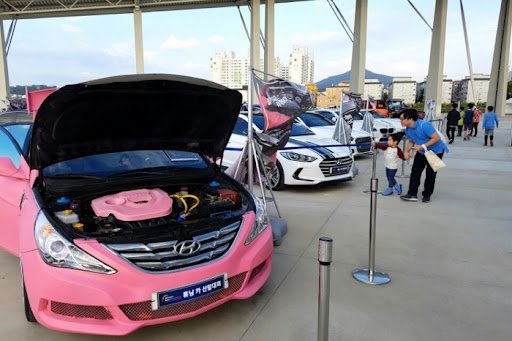
For decades, Korean automakers were known primarily for affordable, reliable transportation rather than high-performance machines. But in the past 20 years, Hyundai and Kia have steadily sharpened their game, producing legitimate sports cars and sport-tuned sedans that compete with global rivals. Today, models like the Hyundai Tiburon, Veloster N, Elantra N, and Kia Stinger stand as milestones in Korea’s performance car journey. Let’s dive into each and see how they stack up.
Hyundai Tiburon (1996–2008)
The Tiburon was Hyundai’s first real foray into the affordable sports coupe segment. While not a powerhouse, it carried sleek styling that appealed to younger buyers.
- Engines: 1.8L, 2.0L inline-4, later a 2.7L V6 (172 hp)
- Transmission: 5- or 6-speed manual, 4-speed automatic
- Strengths: Affordable, stylish, tuner-friendly
- Weaknesses: Underpowered compared to rivals, dated interior, front-wheel drive dynamics limited sporty appeal
- Legacy: Paved the way for the Veloster by showing Hyundai could compete in the sport compact space.
Hyundai Veloster (2011–present, N introduced in 2019)
The Veloster arrived as a quirky 3-door hatchback with asymmetrical styling. It became a true enthusiast’s car once Hyundai introduced the Veloster N.
- Engines: 1.6L turbo (201 hp) in standard trims; 2.0L turbo in N (275–286 hp with Performance Pack)
- Transmission: 6-speed manual, 7-speed DCT (N available with manual or 8-speed DCT)
- Strengths: Engaging handling, powerful N variant, great value, daily-driver usability
- Weaknesses: Base trims feel lukewarm, limited rear space
- Legacy: Elevated Hyundai’s reputation among enthusiasts; the Veloster N proved Korea could build a genuine hot hatch rivaling the VW GTI and Honda Civic Type R.
Hyundai Elantra N (2021–present)
The Elantra N brought Hyundai’s N-division expertise to the compact sedan market.
- Engines: 2.0L turbocharged inline-4 (276–286 hp)
- Transmission: 6-speed manual, 8-speed DCT
- Strengths: Superb chassis tuning, aggressive styling, track-capable performance
- Weaknesses: Bold styling may divide opinion, ride can be firm for some
- Legacy: Competes directly with the Honda Civic Type R and Subaru WRX, establishing Hyundai’s N lineup as world-class.
Kia Stinger (2017–2023)
The Kia Stinger was a bold move: a rear-wheel-drive (or AWD) sport sedan aimed at the likes of the BMW 3 Series.
- Engines: 2.0L turbo inline-4 (255 hp), 3.3L twin-turbo V6 (365–368 hp)
- Transmission: 8-speed automatic
- Strengths: Long wheelbase for stability, luxury touches, true GT performance, RWD dynamics
- Weaknesses: Brand perception limited market success, weightier than rivals
- Legacy: The Stinger proved Kia could build a legitimate sport sedan; while discontinued, it paved the way for Kia’s performance ambitions.
Other Notables
- Genesis Coupe (2010–2016): Rear-wheel-drive coupe with 2.0T and 3.8 V6 engines, a stepping stone between Tiburon and Stinger.
- Genesis G70 (2017–present): A luxury sports sedan with turbo-4 and twin-turbo V6 options, essentially the premium successor to the Stinger.
Comparison Chart
| Model | Years Active | Engine Options | HP Range | Drivetrain | Transmission | Strengths | Weaknesses |
|---|---|---|---|---|---|---|---|
| Hyundai Tiburon | 1996–2008 | 1.8L I4, 2.0L I4, 2.7L V6 | 130–172 | FWD | 5/6MT, 4AT | Affordable, stylish, tuner-friendly | Underpowered, dated interior |
| Hyundai Veloster | 2011–present | 1.6L Turbo I4, 2.0L Turbo (N) | 132–286 | FWD | 6MT, 7/8DCT | Fun, versatile, true hot-hatch in N trim | Limited rear space, quirky looks |
| Hyundai Elantra N | 2021–present | 2.0L Turbo I4 | 276–286 | FWD | 6MT, 8DCT | Track-ready, sharp dynamics, value | Firm ride, polarizing styling |
| Kia Stinger | 2017–2023 | 2.0L Turbo I4, 3.3L Twin-Turbo V6 | 255–368 | RWD/AWD | 8AT | RWD handling, luxury GT, strong V6 power | Heavy, discontinued, pricey |
| Genesis Coupe | 2010–2016 | 2.0T I4, 3.8L V6 | 210–348 | RWD | 6MT, 8AT | RWD fun, affordable alternative to 370Z | Interior quality, refinement |
| Genesis G70 | 2017–present | 2.0T I4, 3.3L Twin-Turbo V6 | 252–365 | RWD/AWD | 6MT (rare), 8AT | Premium refinement, strong dynamics | Expensive, small rear seat |
Final Verdict
- Best Classic Starter: Hyundai Tiburon — more style than substance, but affordable nostalgia.
- Best Hot Hatch: Hyundai Veloster N — playful, powerful, and a true enthusiast’s car.
- Best All-Rounder: Hyundai Elantra N — blends daily usability with serious track credentials.
- Best GT Cruiser: Kia Stinger — a Korean take on the luxury sport sedan, with real muscle.
- Best Premium Choice: Genesis G70 — Korea’s answer to the BMW 3 Series.
Conclusion
Korea’s journey in the sports car world reflects its broader automotive rise: from modest beginnings (Tiburon) to global credibility (Veloster N, Elantra N, Stinger, and G70). Each car represents a step toward performance legitimacy, and today, Hyundai’s N-division and Genesis brand stand shoulder-to-shoulder with established performance marques.
